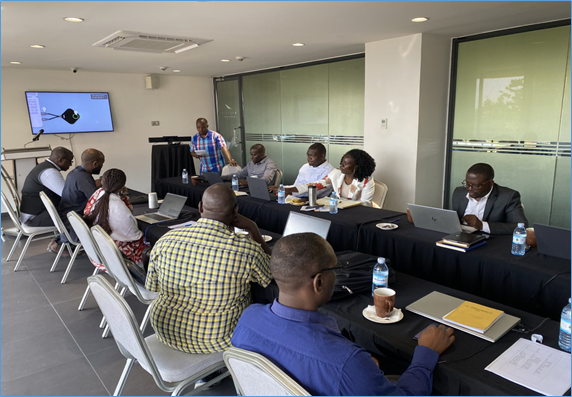CAPACITY BUILDING WORKSHOP ON VIRTUAL ASSETS (VAS) AND VIRTUAL ASSET SERVICE PROVIDERS (VASPS) HELD 26TH-30TH JUNE, 2023.
The Virtual Asset Working Group of the Financial Intelligence Authority recently concluded an intensive week-long workshop focused on enhancing knowledge and understanding of virtual assets and their associated risks. The workshop aimed to equip participants with practical tools and strategies to effectively regulate and supervise virtual asset service providers (VASPs) in line with global best practices.
Throughout the workshop, experts from various fields, including blockchain technology, legal and regulatory frameworks, and financial intelligence, provided insightful presentations and engaged in interactive discussions with participants.
Highlights and outcomes from the workshop:
- Supervisory Mechanisms and Licensing: The workshop explored different supervisory models for VASPs, focusing on the licensing and oversight processes. Participants examined the key considerations in granting licenses, ongoing supervision, and enforcement actions. Best practices in establishing effective supervisory frameworks were shared to ensure the integrity and stability of the virtual asset ecosystem.
- Regulatory Frameworks and Compliance: The workshop delved into the diverse regulatory frameworks governing virtual assets globally, providing participants with insights into various approaches to regulating VASPs. Compliance measures, including anti-money laundering (AML) and combating the financing of terrorism (CFT) requirements, were discussed in detail to ensure a robust and effective regulatory environment.
- Risk Assessment and Mitigation: The workshop emphasized the significance of risk assessment in the virtual asset realm. Participants learned about various methodologies for assessing and mitigating ML/TF (money laundering/terrorist financing) risks associated with VASPs. The importance of ongoing risk monitoring and the utilization of innovative technologies for risk mitigation were also highlighted.
- Supervisory Mechanisms and Licensing: The workshop explored different supervisory models for VASPs, focusing on the licensing and oversight processes. Participants examined the key considerations in granting licenses, ongoing supervision, and enforcement actions. Best practices in establishing effective supervisory frameworks were shared to ensure the integrity and stability of the virtual asset ecosystem.
- International Collaboration and Information Sharing: Recognizing the transnational nature of virtual assets, the workshop emphasized the importance of international collaboration and information sharing. Participants explored avenues for fostering cooperation between jurisdictions, sharing intelligence, and addressing challenges related to cross-border transactions.
Overall, the week-long workshop proved to be an invaluable platform for knowledge exchange, capacity building, and the strengthening of regulatory frameworks within the Virtual Asset Working Group. Participants left with enhanced expertise and a renewed commitment to effectively regulate and supervise virtual asset service providers, fostering a secure and transparent financial ecosystem for all.
The Virtual Asset Working Group expresses its gratitude to the United Nations Office on Drugs and Crime, expert speakers, and stakeholders for their active engagement and contributions to this successful event. The knowledge gained during the workshop will shape future endeavours in ensuring effective regulation and supervision of virtual assets in alignment with global standards.

